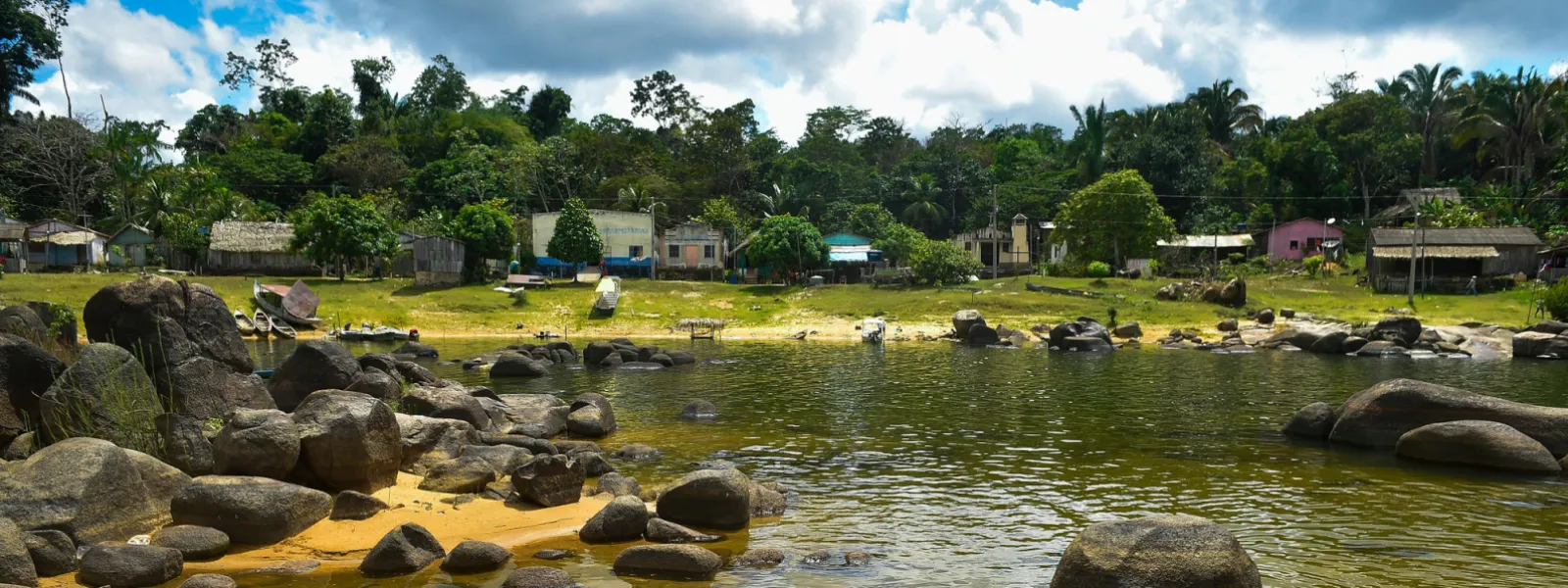
Belo Sun project puts Amazon at serious risk of contamination
Photo: Marcelo Soubhia/ISAThe Canadian company developing Belo Sun is failing to take sufficient measures to prevent a planned gold mine from contaminating groundwater and surface water sources. The company also plans to use large quantities of cyanide, a substance highly dangerous to the health of people and ecosystems.
Altamira, Brazil. A technical evaluation concluded that a gold mine planned for the Volta Grande of the Xingu River, deep in the Brazilian Amazon, risks contaminating water sources and harming the area’s indigenous and riverine communities.
A project of the Canadian company Belo Sun Mining Corp., the mine could leech contaminating fluids, and would employ high quantities of cyanide, as well as other chemical processes that could, unless properly implemented, cause acidic waste to reach aquifers and rivers.
The analysis prepared by Andrés Ángel, geologist and scientific advisor to the Interamerican Association for Environmental Defense (AIDA), found inconsistencies in the information the company has published in the environmental licensing process.
In the 2015 feasibility report presented to the project's investors, Ángel found that the company stated that the area’s soil and shallow rocks are impermeable, that is, contaminants cannot seep through them. However, in 2012 and 2016 environmental impact studies, Belo Sun shows the regulatory authorities data, descriptions and analyses that contradict what was said in 2015, going so far as to say that the aforementioned soils and rocks behave like porous or fractured aquifers.
In recent studies, the general design of the project and the management measures proposed by the company, which do not even include installing liners to prevent leaching under certain structures, are insufficient to reduce the risk of surface and groundwater contamination, the expert explained.
The evaluation also warns of the use of large quantities of cyanide as the method of choice for the separation of gold. It’s expected that between 330 and 390 grams per ton of processed material will be used, out of an estimated total of 116 million tons of ore.
"Less polluting and dangerous alternatives exist, including the export of polymetallic concentrates where the separation of material of economic interest occurs later. In the Amazon rainforest, it would be essential to consider this option" says Ángel.
The report also highlights that cyanide can be lethal even in very low doses for both aquatic fauna and people, and points out the risks of transporting this substance through low quality road and fluvial infrastructure.
Another serious risk highlighted by the study is the generation of acid drainage as a result of the chemical process planned by the company to eliminate the cyanide used, and as a cumulative impact after the project's lifetime, taking into account that some units were classified as having moderate acid generation potential. Although an active treatment (the addition of lime to effluents) is proposed for this purpose, such a measure implies greater demand for reagents and, therefore, greater total environmental impacts.
Finally, Ángel highlighted the lack of information on the synergistic impacts between the Belo Monte Dam—which already affects the area—and the downstream mining project in the reduced flow section of the Xingu River, which in turn will determine the type and extent of the mine's risks in the event of serious failures.
The Brazilian justice system suspended Belo Sun’s installation license in 2017 because the company did not conduct studies on the mine's impact on indigenous communities or comply with the requirement for a free, prior and informed consultation process. Belo Sun submitted the studies of the indigenous component to the National Indian Foundation (FUNAI) in early 2020 and is awaiting an assessment and response from the entity.
Ángel's assessment was presented to FUNAI and the Secretary of State for the Environment (SEMAS) of Pará, the entities responsible for granting licenses for the project. The expert opinion joins two others presented as part of a joint effort by independent researchers whose work explicitly demonstrates the unfeasibility of the Belo Sun project as it is currently conceived. The previous opinions focused on the negative impacts of the project on the ichthyofauna, and on the fragility of the environmental impact studies submitted by Belo Sun from a geological point of view.
In addition to the independent researchers, several organizations have denounced the social and environmental unfeasibility of the project, including the Xingu+ Network, the Xingu Alive Forever Movement, Amazon Watch, the Socio-Environmental Institute (ISA), International Rivers, Above Ground and AIDA.
Contacts
Marina Terra (Brazil), ISA, [email protected]
Victor Quintanilla (Mexico), AIDA, [email protected], +5215570522107
